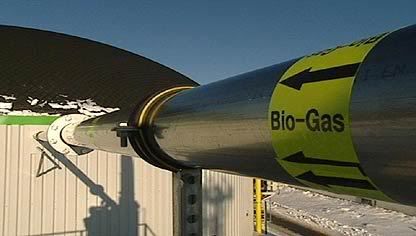Cleaning up the Gas Grid
Posted by Big Gav in biogas
Renewable Energy World has an article on expanding the use of biogas in the gas network, taking a detailed look at experience in Germnay - Cleaning up the Gas Grid.
In Germany electricity production from renewable sources is supported at a special rate as set out under the renewable energy law (EEG). This special rate applies to electricity produced from biogas transmitted through the natural gas grid, but is also increased by an additional bonus for use of innovative technology, such as biogas upgrading. In addition, a new law on heating with renewable energies came into effect in 2009, which requires new buildings to be heated with a share of at least 20% of renewable sources or combined heat and power (CHP). Furthermore, there is a negotiated environmental agreement by the gas utilities in Germany to add at least 10% biogas to natural gas for vehicle fuel (LPG) in 2010 and 20% by 2020.
The main operational advantages of biogas feed-in to the natural gas distribution grid are that the biogas can be used at higher energy efficiency where the waste heat can be used. In addition, by using the gas grid for virtual storage, time-decoupling between biogas production and consumption can also be achieved.
In spring 2008 the energy utility Energie Baden-Württemberg (EnBW), together with its gas grid subsidiary Erdgas Südwest (ESW), began operations at a new facility, upgrading biogas and feeding it into to the natural gas grid. The bio-methane is produced in co-operation with an agricultural company of 20 farmers who own and operate the fermentation biogas plant and procure the biomass. The gas is produced by the farmers and sold to EnBW-ESW, which ensures the quality necessary in the gas distribution system, the measurement required for invoicing and deals with transport to the customer. Around 5 million Nm3 of raw biogas is upgraded annually to around 2.8 million Nm3 of biogas at natural gas quality and fed into the gas grid.
In conventional biogas plants in Germany the biogas is burnt in a co-located reciprocating-engine. This is normally in a rural area, where heat demand is very restricted. While some 15%–20% of the exhaust heat is consumed by the fermenter, in most cases the rest is difficult to sell and, as a consequence, the efficiency of biogas plants is limited. However, even under EEG-tariffs for electricity production, without heat sales it is becoming more and more difficult to achieve the economic operation of a biogas plant. Conversely, if biogas can be transported to a heat sink, a CHP plant can utilize the bioenergy much more efficiently and can supply heat at a better value and so at a higher income. If the biogas is to be transported in the wider natural gas grid, it has to be upgraded to meet the quality needed for the grid.






